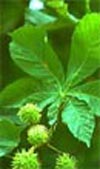



Horse chestnut

Avoid Horse chestnuts
Aesculus hippocastanum
Horse-chestnut
Conker tree
Avoid horse chestnut if you have liver or kidney disease or if you are pregnant or breast feeding. Poisonous to horses. Horse Chestnut can be made into a cream to lessen spider veins. If you have liver cysts and matted telangectasias it is not recommended as horse chestnut can cause liver problems. Aesculus hippocastanum or horse chestnut studies done in Europe found that horse chestnut helped to increase blood flow up and out of the legs, strengthen connective tissue, tighten up veins, decrease redness and swelling, and relieve painful leg conditions caused by poor circulation. One of its compounds, Aescin, has been found to close the small pores in the walls of the veins, making them less permeable. This strengthens the vein walls and reduces leakage of fluid into the surrounding tissues. Unlike diuretics, horse chestnut is unlikely to cause potassium deficiency or raise blood pressure. AVOID may be harmful to liver when taken internally.
The nuts, especially those that are young and fresh, are slightly poisonous, containing alkaloid saponins and glucosides. The nuts were previously used in France to whiten cloth: flax, hemp, wool, and silk. However there is a risk in its use for acute kidney failure. Do not take this within two weeks of any major surgery.
